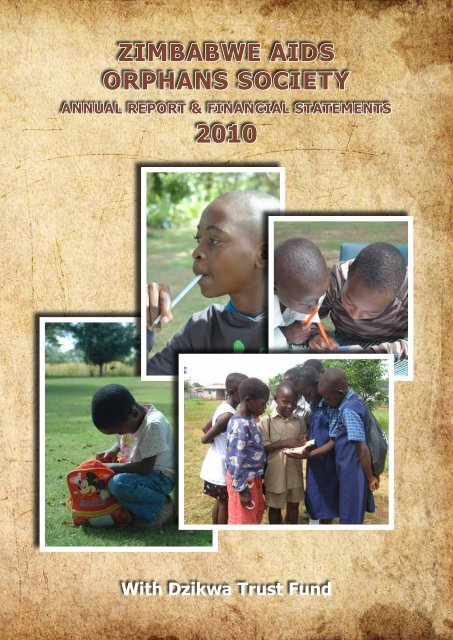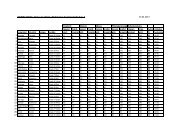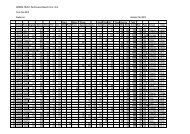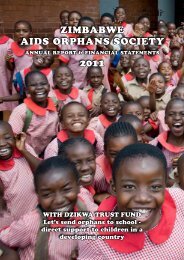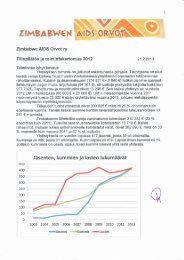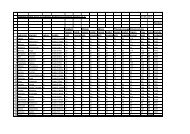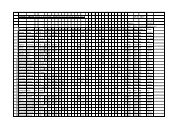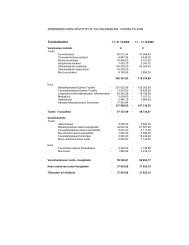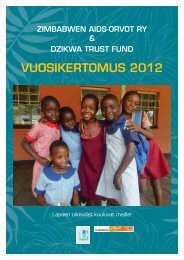ZIMBABWE AIDS ORPHANS SOCIETY ANNUAL REPORT ...
ZIMBABWE AIDS ORPHANS SOCIETY ANNUAL REPORT ...
ZIMBABWE AIDS ORPHANS SOCIETY ANNUAL REPORT ...
- No tags were found...
You also want an ePaper? Increase the reach of your titles
YUMPU automatically turns print PDFs into web optimized ePapers that Google loves.
THE <strong>SOCIETY</strong> IN BRIEFOur conceptThe Zimbabwe <strong>AIDS</strong> Orphans Society (henceforththe Society) was established in 2003 to support developmentcooperation at grassroots level in Zimbabwe.The purpose of the Society is to secure thebasic education of around 400 orphans and to seeto their overall welfare and development. We givelong-term help to hard-working, underprivilegedchildren in their own community. The children’sneeds define the content and direction of our work.We participate directly in the implementation ofchildren’s rights in a developing country. The UNConvention on the Rights of the Child states thatevery child is entitled to:• free basic education• a life free from danger• enough to eat• access to health care• rest, play, leisure and opportunities toparticipate in cultural activities.All smiles at Nhamburiko Primary School.Our programme has neither political nor religiousaffiliation.Our mission Our vision Our valuesTo create the conditions for theeducation and general welfare ofdiligent and needy orphans in adeveloping country.To increase the orphans’human capital and give them theresources to lead fulfilling lives,thus making them pivotal to theprogress of their own country.The Dzivarasekwa orphans in ourprogramme will help to build uptheir own country thanks to thegood start to life given them by asound basic education.Dzikwa’s own Activity Centre willbe the hub of support activitiesfor the 400 children in theprogramme.We cherish the education, knowledgeand skills of children, girls inparticular.We act openly, and with honestyand a sense of responsibility, seekingto foster cooperation. Wevalue initiative, hard work, andhelp for the less fortunate.We value protection of our ownenvironmentOur field of operationsWe work in Zimbabwe, a landlocked country insouthern Africa bordered by Botswana, Zambia,Mozambique and South Africa. It has a populationof 12 million. Formerly known as South Rhodesia,Zimbabwe gained its independence in 1980. Accordingto the latest report by UN<strong>AIDS</strong> (HIV and<strong>AIDS</strong> Estimates 2009), some 22.5 million people areHIV positive in Sub-Saharan Africa and, of these, 1.2million live in Zimbabwe. In 2009, HIV prevalencein Zimbabwe was 14.3%, in South Africa 17.8% andin Uganda 6.5%. The number of children estimatedto be living with HIV in Zimbabwe in 2009 was150,000, and the number orphaned by HIV/<strong>AIDS</strong>was thought to exceed one million.Our Society concentrates its support efforts onDzivarasekwa, a township on the outskirts of thecapital, Harare. Dzivarasekwa is a densely populatedsuburb with a population approaching 100,000.The real increase in school fees in Zimbabwe has ledto a sharp drop in the number of children at schoolin Dzivarasekwa; in 2010, only two-thirds of theroughly 25,000 school-age children were at school.4
How cooperation with our Zimbabweanpartner works in practice• The Society collects subscriptions from its members,and sponsorship payments, donations, andother funds and resources from its sponsors andsupporters. The Society receives a project grantfrom the Finnish Ministry for Foreign Affairs (MFA)under its NGO Development Cooperation Programme.• The support activities are implemented by theZimbabwean partner, the Dzikwa Trust Fund(henceforth Dzikwa), set up in 2002, and by thelocal Friends of Dzikwa Society. The terms of referenceand division of duties are set out in a writtencooperation agreement.• The Society donates the sponsorship payments,project support and other resources in full toDzikwa direct for the purposes set out in the cooperationagreement.• Dzikwa plans, steers, implements and supervisesall support activities in the field. Spending ismonitored by the Dzikwa Board, of which SeppoAinamo is a member.• Dzikwa staff members are in daily contact with thechildren.• Every effort is made to keep the total numberof children at a level that enables Dzikwa staffmembers to be familiar with the home conditions,school performance and personality of all the children.A record with photographs is kept of eachchild.• Dzikwa pays all expenses arising from the children’seducation, meals, health care and othersupport activities direct; no money is given to thechildren themselves or to their guardians.• Sponsors can keep in touch with their childrenand, along with other supporters, visit Zimbabweto meet the children and see how our programmeworks.• In Finland, the operation is run entirely by volunteers.In Zimbabwe, Dzikwa employs a small permanentstaff and hires local people on a temporarybasis as required.• In both countries, the accounts are audited bychartered accountants.contact the Society by phone, letter or e-mail, orthrough the Society’s website or Facebook. Wewould like prospective sponsors to tell us how theyfound out about the programme in the first place.We will add the sponsor’s details to the Society’srecords; there is no formal written sponsorshipagreement. The idea is that the sponsor supportsthe child’s basic education, possibly up to A-levels(matriculation). A sponsor can stop supporting achild by letting the Society know, preferably beforethe start of a new school year.It is possible to sponsor one or more named children,to be a general sponsor, or to sponsor theDzikwa Shelter. The annual sponsorship paymentsare set at the Society’s meeting in December at thesame time as the operating plan and budget for thefollowing year are approved. Sponsors deposit thepayment in the Society’s account either as a lumpsum or in instalments to suit themselves.Sponsors decide for themselves how closely theywant to be involved in the lives of the children theysupport. Some sponsors simply make the sponsorshippayment; others keep in touch with their childby letter or even by visiting Zimbabwe. The childrenand their guardians are not given the sponsor’s contactinformation. All contact and arrangements forvisits take place through the programme directors.Sponsorship payments in 2010 were:primary school (Grades 1-7) € 240secondary school (state school)(Forms 1-6)secondary school(private day school)(Forms 1-6)secondary school(Dewure boarding school)(Forms 1-6)€ 320€ 400 - 480€ 480higher education (minimum) € 6002010 marked the eighth year of the Society’s operations,though the Finnish founders, Seppo Ainamoand Oili Wuolle, first started to support orphansback in 1992. Seppo and Oili spend about half theyear in Zimbabwe directing operations on the spot.What it means to be a sponsorPersons interested in becoming sponsors canOili surrounded by children.5
Children receive comprehensive supportThe support collected by the Society covers schoolcharges, uniforms, shoes and sportswear, text andexercise books and other school accessories plusparticipation in extra lessons if necessary. In addition,the children receive one hot meal every day ofthe year and basic health care. They are also giventhe opportunity to participate in tree planting andenvironmental education. Extra-curricular activitiesinclude art and cultural education and field trips. Allchildren can attend at least one joint cultural andone joint sports event a year. Dzikwa also runs ashelter for 30 homeless orphans.Higher education and getting a jobOur programme seeks first and foremost to ensurethat the children receive basic education, up to A-level (matriculation) standard. The decision to supporthigher education is always made individuallytogether with the sponsor. Dzikwa helps find suitableplaces of study and opportunities for scholarshipsand acquires the necessary recommendations.Most children are given a chance to re-take theirO- and A-level exams in which they did not do well.It is almost impossible to go onto higher educationor get a job in Zimbabwe without O-levels.A number of school-leavers have helped Dzikwawith field work or in the office. In recent years,DZ No. 4 primary school childrenefforts have been made to give the children studycounselling at junior secondary stage to help themselect their A-level subjects, as they have little conceptof the subjects required for certain careers.Youngsters educated through Dzikwa are currentlystudying, or have finished their studies in, hairdressing,pharmatechnology, motor vehicle systems,tourism and teacher training. Two students havecompleted bachelor’s degrees, one in accountingand one in history/development studies.A good meal7
KEY FIGURES OVER THE YEARSKEY FIGURES OVER THE YEARSTrend in member and sponsor numbers, and in numbers of children receiving support since theKEY FIGURES OVER THE YEARSfounding Trend member of the and Society sponsor numbers, and in numbers of children receiving support since the foundingof the SocietyTrend in member and sponsor numbers, and in numbers of children receiving support since thefounding of the Society450400450 350400 300350 250300 200250 150200 1001501000500Number of members, sponsors and childrenNumber of members, sponsors and children2003 2004 2005 2006 2007 2008 2009 2010Number of membersNumber of sponsors2003 2004 2005 2006 2007 2008 2009 2010Number of children receiving supportNumber of membersNumber of sponsorsGirls have consistently Number of children made receiving up over support 60% of children in our support programme.Girls have consistently made up over 60% of of children in in our our support programme.Trend in Society's total financingTrend in Society's total financingTrend in Society’s total financingEuro Euro450 000400 000450 350 000400 300 000350 250 000300 200 000250 150 000200 100 000150 000100 000050 0000Trend in Society's financingTrend in Society's financing2003 2004 2005 2006 2007 2008 2009 2010Ministry for Foreign Affairs (MFA) grants2003 2004 2005 2006 2007 2008 2009 2010Funds raised by the Society and value of donations in kindMinistry for Foreign Affairs (MFA) grantsFunds raised by the Society and value of donations in kind8
TREND IN <strong>SOCIETY</strong>’S TOTAL FINANCINGNumber and distribution of childrenIn 2010, Society support focused as before on twogroups of children, Alpha and Omega. Every childin the Alpha group has a personal sponsor and receivesfull support from Dzikwa in the course of theyear. The children in the Omega group do not satisfyall five criteria. They do not receive full supportfrom Dzikwa and do not have a personal sponsor;they are selected on social grounds from among themost deprived.In term III 2010, 359 children were receiving supportfor basic education and 18 for higher education.The total was therefore 377, of whom 314 were inthe Alpha group (285 at the end of 2009) and 48 inthe Omega group (138 at the end of 2009). In termII, 435 children were receiving support, but we hadto reduce the size of the Omega group and givepriority, as we already had in 2009, to sponsoredchildren. Dollarisation of the economy in February2009 led to a drastic increase in the real cost of education,and we were compelled to increase the numberof sponsored children to ensure that there wassufficient funding for other operations. The numberof children also fluctuates in the course of a year, assome may move away whilst others urgently in needof help, and who fulfil the programme’s criteria, maycome to Dzikwa’s notice.Distribution of children receiving support in term III 2010 and term I 2011LevelIII/2010GirlsIII/2010BoysIII /2010TotalI/2011GirlsI/2011BoysI /2011TotalPrimary Grades 1-7 127 72 199 124 75 199Junior SecondaryForms 1-4Senior SecondaryForms 5-687 54 141 91 56 14711 4 15 19 9 28Schools for Disabled 3 1 4 3 1 4Schools Total 228 131 359 237 141 378Higher Education 9 9 18 15 12 27Total 237 140 377 252 153 405Forty-two of the secondary school pupils (25 girlsand 17 boys) were at Dewure Secondary School, aboarding school 250 km south of Harare. Dzikwa cansend a child to boarding school with the consentof the sponsor if the guardian’s situation and homeconditions are particularly difficult and if the child isdoing sufficiently well (average grade at least 70%).Girls make up almost 63% of children receiving support.For the latest term I 2011 figures by schooland level, please refer to our web site at www.zimorvot.orgFinal examsIn 2010, 29 pupils took the Grade 7 Exam and 39 (3re-sits) their O-levels; 26 gained high enough marksto continue to A-levels. Six pupils sat for their A-levels.Dzikwa’s two best pupils gained 10 points andone pupil 9 points, the maximum number of pointsbeing 15.A total of 25 Dzikwa children were made prefectsduring the year.9
Health care and welfareWith the support of the Society, Dzikwa was able tosend children with acute health problems to a doctoror hospital and to purchase medication. Typicalmild disorders were colds, gastric upsets, parasites,asthma, various skin diseases, minor contusions andburns. There were also some cases of malaria andepilepsy and one case of psychosis.During the year, Dzikwa children paid 140 visits tothe doctor and health care centre (165 in 2009). Themajority of these were to Dr Chagonda’s clinic inDzivarasekwa, which gives Dzikwa a 50% discount.Dzikwa ShelterAs a matter of principle, children are not movedaway from their extended family. The majority livewith relatives, the tradition of the extended familybeing strong in Zimbabwe. Nevertheless, there aresome without a decent place to live and who aretherefore unable to go to school on a regular basis.For them, Dzikwa has maintained a small shelteron Rujeko Street since June 2005. The maximumDzikwa also organises acute dental care and eyetests and buys spectacles. Dental care was prioritisedin 2010. At the beginning of the year, Dzikwawas visited by Professor Karin Warfvinge fromSweden, who was doing aid work with Zimbabwe’sMethodist Church dental clinic. As a result of herChildren in the Dzikwa Shelternumber of children in the shelter is 30. They arein the care of a matron employed by Dzikwa, wholives with them, sees to their daily needs and keepsan eye on them generally. The Dzikwa Shelter alsohouses a library for all Dzikwa children, and providesfacilities for meetings, extra lessons, and gettogethers.Professor Warfvinge examines teethIn September 2010, Dzikwa stopped renting JuniorHouse, which it had been running for two years.It was no longer required once the small storagebuilding was completed on the Activity Centre siteand the new kitchen and dining hall were opened.visit, two Swedish dental students from the “DentistWithout Borders” programme examined the teethof 292 Dzikwa children at a mobile clinic set up bythe Methodist Church. Twenty-five children weregiven immediate acute treatment; the others wereseen in order of urgency.Medical costs were partially covered, as in previousyears, by a German organisation, Harare e.V., fromBonn, which includes several sponsors among itsmembers. In Harare, Dzikwa receives local supportfrom the city’s leading private hospital (St Anne’s),which provides, when required, beds and the servicesof an operating theatre free of charge. Dzikwachildren are also given free treatment by a dermatologistand a leading local ophthalmologist.The Dzikwa Shelter had its very own cat13
Dzikwa Marimba & DancersCULTURAL AND SPORTS ACTIVITIESDzikwa organises a sports day for the children, art,cultural and environmental events, entertainments,and short field trips. In the year under review,cumulatively a total of 2000 Dzikwa children tookpart in 30 extra-curricular events (in 2009 the totalwas 1657 in 19 events).Music, dancing and singingThe organised singing, instrumental, dancing anddrama instruction launched in 2006 continued withenthusiasm under the direction of Pamuzinda, a localmusic and dance group, with financing from theGerman sponsors Harare e.V. In the course of 2010,over 100 children (fewer than 100 in 2009) took partregularly in marimba, dance and drama groups,which in term time met for two hours on Saturdaysand Sundays. Dzikwa has its own 20-voice choir anda number of smaller choirs.Harare International Festival of ArtsZimbabwe’s International Festival of Arts (HIFA),which is held every year at the end of April and beginningof May, is a very special occasion for theDzikwa children. Since 2009, the “Dzikwa Marimba& Dancers” have performed in the Youth Zone. On29 April 2010, they put on a dazzling 45 minuteshow of music, singing and dancing that attractedconsiderable attention. Thanks to free tickets fromthe HIFA management, 140 children got to enjoyother events at the Festival.Other performancesThe Dzikwa Marimba & Dancers also performedat the University of Zimbabwe arts festival on 23March; at Chipawo’s Cultural Party on 28 July, andat the launch of the Zimbabwe Health Sector InvestmentCase 2010 at Harare Central Hospital on8 October. The latter was attended by the ActingPrime Minister, the Minister of Health and ChildWelfare, plus country directors of UNICEF and otherorganisations.14
The theatreAs in previous years, visits to the theatre wereimportant dates in our busy cultural calendar. In2010, 145 children were taken to the local REPStheatre and Theatre in the Park. At the beginning ofDecember, 94 children enjoyed the traditionalChristmas pantomime, this time “Babes in theWood”.Toys for all and Christmas funIn November, our two very youngest sponsors, Aino-Leenaand Maarja, distributed many bags of toysto the children. Dzikwa held its own Christmas partyin the new dining hall on 5 December. The partywas attended by 278 happy children and, of course,Santa.Dzikwa Annual Sports DayAs in previous years, the top sporting event in 2010was Dzikwa’s very own sports day, held this time onFriday 3 September, in the B arena of Zimbabwe’sNational Sports Stadium. Altogether 340 enthusiasticathletes competed in the five track-and-fieldevents as both individuals and teams. Guest of honourwas the Acting Permanent Secretary of the Ministryof Education, Sport, Arts and Culture. A bandof Zimbabwean volunteers plus donations from severallocal businesses all helped to make the day asuccess.The little Parisiennes give toys to everyoneVote of thanks from the Acting Permanent Secretary15
ACTIVITY CENTRE PROJECTThe ball court and kitchen block are readyIn 2006, Dzikwa bought a one-acre site from theCity of Harare. Located on Rujeko Street, it is rightin the heart of Dzivarasekwa. Since then, the sitehas been gradually developed, depending on theamount of money available. Fundraising for buildingis kept separate from the financing of ordinaryspace for supplies, which, until now, have been keptin the homes of staff members.In 2008-2009, a wall was built round the site, water,electricity and plumbing were connected, anda bore-hole with two 5000 litre water tanks was installed.A small storage building with a terrace andtoilets for boys and girls was also built. The projecthas been directed and supervised free of charge bythe Old Mutual insurance company, which, by helpingDzikwa, has made a contribution to its communityresponsibility.Development of the Activity Centre site made greatstrides in 2010. In mid-May, the full-size ball courtwas opened. This can be used for basket-ball, tennisand volley-ball. The opening ball was thrown by theMayor of Harare.Mayor Masunda with his wife and Dzikwa’s Chairman,Stephen Chifunyiseactivities. The aim is to build an Activity Centre thatwill serve as the focal point of all Dzikwa’s supportwork with the children. As well as a kitchen/dininghall and vegetable garden, the Activity Centre willhave facilities for homework, extra lessons, clubs,get-togethers, ball games and celebrations plus officesfor the field workers. There will also be storageNovember saw the inauguration of the new kitchenand dining hall. The occasion was honoured by thepresence of Finland’s Ambassador to Zimbabwe,Mrs Sinikka Antila, who is resident in Lusaka, Zambia;Zimbabwe’s Deputy Minister of Education, Sport,Arts and Culture, Dr L Dokora; and representativesof many other important stakeholders. The buildingof proper kitchen and dining facilities was made possibleby a grant of €80,000 from Finland’s Ministryfor Foreign Affairs (MFA) development cooperationfunds. Notable contributions to the financing camefrom the Supreme Grand Royal Arch Chapter ofScotland, German sponsors, and one private individualwho donated his lecture fees.Moving the children’s meals to a spacious, practicaland smoke-free building was cause for rejoicingto children and staff alike. The kitchen is fitted withAt least there was enough water!16
The children clean up the court after a downpourprofessional cooking and storage facilities, refrigerationequipment for an institutional kitchen boughtwith the support of the Rotary Foundation, an electricstove and two ovens, an electric boiler, and agas stove. The bulk of the fittings and furniture weredonated by three Finnish schools: Hansakallio andTähtiniitty schools in Espoo and Klaukkala school inNurmijärvi. In no time at all the dining hall and long,covered terrace were being used for study, rehearsalsof the Dzikwa’s Marimba & Dancers, meetingsand parties. Film evenings are already a big successthanks to the cinema sound reproduction system donatedby Zacks, a local home electronics store, anda collection of DVDs donated by sponsor Markku.The spacious and well-equipped new kitchenMeals used to be eaten outdoors sitting on thegroundCooking was still a smoky business at thebeginning of the yearThe old kitchen was a firewood guzzlerThe new dining hallhas plenty of room17
Vegetable garden and compostingDzikwa’s vegetable garden, which had been plantedin an area set aside in the backyard of DZ No. 4School, was moved to the Activity Centre when thenew kitchen/dining hall was opened and now the childrencan enjoy their own home-grown vegetables.In December, work started on a separate compoststructure, and we have plans for worm composting.Fund for Local Cooperation/PYM) awarded to Dzikwadirect by the Finnish Embassy in Lusaka. Buildingwork done by the local Durawall Company hasbeen on schedule and the intention is to open an ITclassroom and Internet connection in May 2011. TheLohja Rotary Club was responsible for getting a Finnishvocational school to donate good used computers,which were shipped out in the 2010 container;one Lohja Rotarian donated a generator.The Activity Centre still lacks decent washing facilitiesfor the children, a caretaker’s accommodation,and an office building for the field workers, head ofprocurement and accountant. The financing, an estimated€150,000, has not yet been secured.Cabbages from Dzikwa’s own vegetable gardenOn-going and future construction projectsThe next construction stage got underway in late2010 with the building of the ICT Block. Financinghas been secured in the form of a grant (FinnishThe Scottish Grand Master Mason andhis wife with their childrenLaying the ICT Block foundations18
The Activity Centre’sthe place to meet palsFORESTRY PROJECT ANDENVIRONMENTAL EDUCATIONForestry project given the go-aheadSince 2008, Dzikwa has been planting eucalyptusseedlings with the help of the children and a localenvironmentalist on a small area of waste land inDzivarasekwa. In 2010, tree-planting plans were finalised.Dzikwa is committed to planting 60 hectareswith a minimum of 8,000 seedlings annually in thecourse of the next 10-15 years. A long-term leaseagreement for the wasteland is being drawn up withHarare City Council.Mr Mhakayakora inspects young trees19
A field trip to Imire means elephant ridesField tripsAltogether 49 orphans (52 in 2010) who had doneparticularly well at school or whose sponsors werevisiting went on field trips to one or more of the following:Chipangali Wildlife Orphanage in Bulawayo,the Great Zimbabwe Ruins, Bulawayo Natural HistoryMuseum, Imire Game Reserve, Chengeta andPamuzinda Safari Lodges, Antelope Park, and theLion & Cheetah Park. These outings give the childrena chance to enjoy the unique natural surroundingsof their country, see and learn about wild animalsand plants, and learn to appreciate how muchtheir beautiful country has to offer tourists and othervisitors.Oranje the lion cub at ChipangaliWildlife Orphanage loves a cuddle21
ADMINISTRATION AND FINANCIALSTATUS OF THE <strong>SOCIETY</strong>’S PARTNER,DZIKWA TRUST FUNDAdministration and internal control inZimbabweDzikwa’s organisation remained unchanged in theyear under review. Dzikwa had five permanent employeeson its pay roll: Assan Mponda, accountant;Petronella Moyo, field officer for primary schoolchildren; Levita Chenera, field officer for secondaryschool children; Piona Matienga, Dzikwa Shelter matron;and Priscilla Takawira, who is responsible for thechildren at boarding school and for procurement. Inaddition, Dzikwa had ten fixed-term employees: sixcooks, an Activity Centre guard, a gardener and twomen in the forestry project. When needed, Dzikwaalso employed about ten tutors for extra lessons andother part-time workers.Three short training courses - in operational planning,budgeting and budget monitoring - were heldfor Dzikwa staff.Weekly operative meeting: Practical field work is coordinatedat the weekly operative meeting, which isattended by the Finnish directors when in Zimbabweand volunteers. Key staff members report on eventsin their areas of responsibility according to a setagenda. The meeting decides on future actions andcompiles lists of purchases and other calls on moneyin the following week. Records are kept of all weeklymeetings.Cash usage is monitored on a weekly basis througha rigorous reconciliation exercise. Each staff memberis expected to return all receipts and explain howthe cash was used. In Zimbabwe, most paymentsand purchases have to be made in cash. Hence continuousmonitoring of cash in hand and regular submittingof records of cash spent are essential for efficientfinancial control. All major procurements, eachone backed by several quotations, are also discussedat these meetings. These are paid for separately,using bank transfers whenever possible.An annual budget is drawn up for operations and thebudget is monitored monthly. Dzikwa’s accountanthandles regular items of expenditure approved inthe monthly budget.Operations in Zimbabwe are steered and supervisedby the Dzikwa Trust Fund Board. Stephen Chifunyise,a renowned playwright, cultural figure and formerPermanent Secretary at the Ministry of Education,Sport, Arts and Culture, continued as Chairmanof the Board. The Vice Chairperson was Mrs Y.R.Dune, headmistress of a school for the disabled.Other members of the Board were Unity Sakhe, alawyer and partner in the legal practice of Kantor &Immerman; E.T. Francisco, Assistant Director of theValuations & Estates Division of the City of Harare;Mrs Marah Hativagone, Chairperson of the Friendsof Dzikwa Society and former Chairperson of theZimbabwe National Chamber of Commerce (ZNCC);and Seppo Ainamo, Programme Director. The Boardmet six times.Audited interim accounts are drawn up every schoolterm, at four-month intervals.The Friends of Dzikwa Society, a local, non-governmentalorganisation, was established in May 2009.However, its registration in Zimbabwe as a PrivateVoluntary Organisation (PVO) was still pending atthe end of the year.Financial status of DzikwaThe operating environment in Zimbabwe has beenfairly stable since the dollarisation of the economyin February 2009. In 2010, the economic situationcalmed down and even made favourable progress.However, school costs, in particular the charges setby School Development Associations (SDAs), continuedto rise, and teachers continued to demandincentive payments from the children. These are calculatedfor each child individually and required incash. According to Zimbabwe’s Ministry of Education,Sport, Arts and Culture, these payments willremain in place as long as teachers’ salaries are low.Dzikwa’s own funds were tied by the building of theActivity Centre ball court and kitchen/dining halland by the start of construction of the ICT Block.Dzikwa’s finances were further burdened by theweakness of the euro against the US dollar duringterm II, as Dzikwa’s income is denominated mainlyin euros and expenditure in US dollars.The following key figures were taken from the 2010official financial statements audited by Grant Thornton(Camelsa) Zimbabwe. There was only a slightincrease in Dzikwa’s total operational expenditure,being €257,579 (€255 556 in 2009).Costs for the support of children’s education rose by8%, totalling €114,271 (€105,586 in 2009). Costs forother activities totalled €87,508 (€89,540 in 2009).Vehicle costs came to €21,011 (mileage reimbursementfor two cars) and property maintenance coststo €4,547. Personnel costs accounted for over 4% of22
Breakdown of Dzikwa's expenditure by main sector in 2010Dzikwa's total expenditure 2010: €257,5794 %2 %8 %2 % 1 %5 %44 %Education related costsOther activity costsPersonnel costsVehicle & maintenance costsTelecommunications & IT costs34 %Other administration costsDzikwa Centre maintenance and other costsDepreciationBreakdown of Dzikwa’s expenditure by main sector in 2010Costs for the support of children's education rose by 8%, totalling €114,271 (€105,586 in 2009).Costs for other activities totalled €87,508 (€89,540 in 2009).the total; these have been grouped differently from2009 in that the costs of staff members employedin support activities have been assigned to activitiesdirect. This gives a clearer picture of the totalexpenditure of the various support activities.Administration costs totalled €16,688, or 6.5% ofthe total. The largest items were: telephone andtelecommunication/IT costs €4,052, bank charges€3,640, accountant’s salary and related costs€2,313, office rental and other office costs €3,384,and computers and accessories €1,961.Vehicle costs came to €21,011 (mileage reimbursement for two cars) and property maintenancecosts to €4,547. Personnel costs accounted for over 4% of the total; these have been groupeddifferently from 2009 in that the costs of staff members employed in support activities have beenassigned to activities direct. This gives a clearer picture of the total expenditure of the varioussupport activities.Depreciation of fixed assets amounted to €2,308.Dzikwa capitalised €180,866 as construction expensesfor the Activity Centre.Dzikwa’s financial statements for 2010 recorded adeficit of €6,826.Administration costs totalled €16,688, or 6.5% of the total. The largest items were: telephone andtelecommunication/IT costs €4,052, bank charges €3,640, accountant's salary and related costs€2,313, office rental and other office costs €3,384, and computers and accessories €1,961.Education related and other activity costs in 2010: €201,779Depreciation of fixed assets amounted to €2,308. Dzikwa capitalised €178,588 as constructionexpenses for the Activity Centre.Dzikwa's financial statements for 2010 recorded a deficit of €6,826.Breakdown of Dzikwa's expenditure on education-related and other School activity books & other costs accessories in 20103 %4 % 6 %5 %18 %2 % 3 % 2 %4 %10 %43 %School fees & leviesSchool uniforms & sportswearNutritionHealth careSports & RecreationTravel expensesDzikwa Shelter & Junior HouseForestry project & Vegetable gardenHandicraft projectOther expennses expenses20Breakdown of Dzikwa’s expenditure on education-related and other activity costs in 2010Education-related and other activity costs rose by only just over 3% on 2009, totalling €201,779(€195,125). School fees accounted for 43% of education-related costs, compared to 39% in 2009.As in 2009, uniforms accounted for 10% of education-related 23 costs, and school books and stationeryfor 4%. Children's nutrition accounted for 18% of other activity costs, as against 21% in 2009.
Education-related and other activity costs roseby only just over 3% on 2009, totalling €201,779(€195,125). School fees accounted for 43% of education-relatedcosts, compared to 39% in 2009. Asin 2009, uniforms accounted for 10% of educationrelatedcosts, and school books and stationery for4%. Children’s nutrition accounted for 18% of otheractivity costs, as against 21% in 2009. Health carecosts were at the same level, 5%, as in 2009. Sports,culture and recreation costs, at 3%, were alsounchanged. As a result of the rise in Dzikwa Shelterexpenses, the Shelter plus Junior House togetheraccounted for 6% of all costs.The Handicraft Project was a special initiative in2010, and accounted for 3% of costs. However,revenues exceeded expenses.SOCIAL IMPACTIn ZimbabweDzikwa is not only a major player in securing theeducation and welfare of orphans in Dzivarasekwa;it is also an important employer in the poor township.Dzikwa is relied on in many different ways. Theschools and the children’s guardians and families arevery familiar with Dzikwa’s activities.Two milestones in the construction of the ActivityCentre - the official opening of the ball-court on15 May and the inauguration of the kitchen/dininghall building on 24 November, both of which wereattended by distinguished invited guests - consolidatedDzikwa’s relations with stakeholders. Duringwater cuts, families living nearby have been able todraw water from Dzikwa’s bore-hole, which was financedby the Australian Embassy. Dzikwa gave largeamounts of goods from the container to the St GilesMedical Rehabilitation Centre and its school for thedisabled, and also to the Batsiranai sheltered workplace. The Handicraft Project taught new skills andbrought work to 13 lone mothers of disadvantagedchildren. Dzikwa sends a representative to the Stakeholders’meetings convened at regular intervals bythe Ministry of Education, Sport, Arts and Culture.In tandem with the forestry project, Dzikwa has intensifiedits cooperation with the City of Harare, theForestry Commission and the local Bindura Universityof Science Education. Thanks to the project, BinduraUniversity will have the opportunity to establishcontact with the University of Helsinki, Finland.Dzikwa’s musicians, singers and dancers havereceived invitations to perform in Harare, which hasbrought welcome publicity to the gifted youngstersliving in DzivarasekwaIn FinlandBy way of follow-up to the international awarenessproject that toured Finland in October 2009, the Societydrew attention to the education of Zimbabweorphans through a photography exhibition illustratingthe Rights of the Child, which visited schools andcolleges in 2010. Exhibition material is still availablefrom the Society. The photographs in the exhibition(taken by Mari Waegelein) were distributed as postersto schools and to various organisations after the tour.The container, the fourth of its kind, shipped outto Zimbabwe by the Society in June was a majorendeavour in Finland. Donations were receivedfrom many private individuals and firms in Uusimaaprovince. In the end, a total of 6,973 kg of goods,among them 90 computers obtained through theLohja Rotary Club, were packed. Forty volunteerssaw to it that packing went smoothly. The 20-footcontainer was itself a donation from the LohjaRotary Club, and will remain at the Dzikwa ActivityCentre as storage space. The Niemi removalsfirm provided invaluable help with the transport ofgoods, and the Bank of Finland and the Lohja RotaryClub put storage facilities at the Society’s disposal.One of the seven volunteers in 2010 was a Finnishstudent at a university of applied sciences who didhis compulsory practical training with Dzikwa. Informationabout the possibility of working as a volunteerhas spread, and in 2011 the first Swedish volunteerjoined the programme.In 2010, the Society received favourable publicityon a number of occasions and in the press. EitherSeppo or Oili, or both, talked about their work withthe orphans of Dzivarasekwa as follows:• Kauniainen Rotary Club on 12 January• Lohja Rotary Club on 13 January• Kauniainen Soroptimists on 16 March• Töölö Rotary Club on 14 July• Jukola Art Community, Hiisijärvi, on 5 August• Siuntio Rotary Club on 16 AugustThe following newspapers and magazinesran articles about the programme:• Helsingin Sanomat newspaper on 20 January:“Development cooperation funds to supportorphans’ education”24
• Helsingin Sanomat newspaper on 13 May:Seppo’s birthday story “Businessman turned Dadto hundreds of orphans”• Hufvudstadsbladet newspaper on 15 May: Seppo’sbirthday story “Ainamo supports orphanedchildren”• Halstari/Lohja Rotary Club 4/2009-2010:story about packing the container• Länsi-Uusimaa newspaper on 21 June:“Container-load of help”• Finnish Teachers’ Association magazine Opettaja(Teacher) on 20 August: “From thousands of milesaway”• Sotkamo News on 6 August: “Info on Africa atZimbabwe evening”• Nivala News on 16 August: “My home is full of joy”• Aamulehti newspaper on 7 December: “FinnishSociety built a canteen for orphans”• Hufvudstadsbladet newspaper on 16 Dec: “Look,a murungu”• Gamlas Nyheter News no. 5: “Report from Zimbabwe”In addition, the Society hosted a stall selling Zimbabweanhandicrafts at the Siuntio Festival on 4 September.Oili was on hand to tell people about theprogramme.Salla with her new friendsAs part of the Forestry Project, the Society is collaboratingwith the University of Helsinki and makingcontact with Finnish researchers and students.Many hands make lightwork with Samuli in chargeMinna, too, hasnew friends25
FINANCIAL STATEMENTS 2010<strong>REPORT</strong> BY THE BOARDEconomic developmentThe Society’s operations were stable and severalnew supporters joined the organisation in 2010.Membership at the end of the year stood at 330(281 in 2009) and sponsorship at 314 (273 in 2009).Of the sponsors, 285 were from Finland, and theremaining 29 from Germany, England, Scotlandand Sweden. The staff of Crown Agents in Englandalone supported 14 orphans.With the backing of the Society, Dzikwa was able tomaintain the children’s education support programme,and other activities such as meals, health care and extra-curricularactivities, and continue the forestry projectand other environmental education. The distributionof children receiving support was clearly weightedin favour of those with sponsors, as the sponsorshippayment then covers the bulk of one child’s costs.Despite the growth in revenue from donations, 2010was very challenging financially for the Society, asschool costs in Zimbabwe continued to rise, and theweakening of the euro against the US dollar in termII caused cost pressures. A further financial burdenon Society fundraising was the completion of keybuildings as planned.Operating incomeIn the income statement, the Society’s income isdivided into two main items: operating income, orincome from ordinary activities, and fundraising income.In 2010, operating income totalled €319,157,which was almost 33% more than in 2009. The increaseis mainly due to the fact that operating incomeincludes the Finnish Government grant of€170,000. Of this sum, €90,000 comprised an MFAgrant for basic operations, that is, the educationsupport programme, and an €80,000 grant towardsconstruction of the kitchen.Out of the total operating income, 47% or €149,157comprised contributions from sponsors and otherprivate individuals. Regular sponsorship paymentsamounted to €106,989. Contributions to the foodfund totalled €12,580, to children’s health care€8,375 and to the Dzikwa Shelter €5,681. Othercontributions totalled €15,532.Disregarding the one-time grant from the FinnishMinistry for Foreign Affairs (MFA) for constructionof the kitchen, regular sponsorship payments andother private donations accounted for 62% of operatingincome. Sponsorship payments and donationsfor other support activities from Finland totalled€133,347, or 89%, and from abroad €15,809, or 11%.Operating expensesExpenses for ordinary activities totalled €393,904. Thebulk of the expenses are generated by the direct supportgiven to the Zimbabwean partner, Dzikwa TrustFund, for the education and general welfare of theorphans, that is, €235,040 (including the MFA grantof €90,000), and by donations for construction of theDzikwa Activity Centre, €126,387 (including the MFAgrant of €80,000). A total of €9,590 was recorded indonations in kind for the Dzikwa Activity Centre buildingproject. In addition, €10,573 was recorded as transfersto other targets, primarily support for the Dzikwamothers’ pilot handicraft project, which produces itemsfrom recycled paper and handmade paper.Other operating expenses came to €12,314, of whichtravel expenses accounted for €8,143 and administrativeexpenses for €4,171. Administrative expenses inFinland came to a good 1% of operating income. Administrativeand travel expenses together amounted toless than 4% of operating income.Special fundraising and fundraising costsIn the Society’s financial statements, fundraising isseparated from support activities. In 2010, fundsraised totalled €71,984, of which €9,590 was recordedas container donations to the building project.The Society raised €6,020 in membership fees. Inaddition, fundraising revenues comprised €23,096in cash donations earmarked for the building project,€4,623 in special sales income for the buildingproject, €9,992 from the sale of handicraft projectproducts, and €18,627 from several anniversarydonations and other items.Fundraising costs totalled €4,664 and containershipping costs €5,195.Surplus/deficit for the financial yearThe Society recorded a loss in 2010, the deficit forthe financial year being €12, 657.Capital at the end of financial year 2010 showed adeficit of €11,510.08. The situation has been amended atthe beginning of 2011. The Board has decided to enforcestricter financial control to avoid the recurrence of suchsituations in the future. In 2011 every effort will be madeto ensure that the main expenses, that is, the support paidto Dzikwa, does not exceed income. There is no intentionto finance activities with even short-term loans.26
FINANCING OF ACTIVITIES ANDEXPENDITUREFunding principlesThe Society collects the money needed for administrationin Finland as membership fees. The Societyacquires the bulk of the financing needed to supportthe children’s education as annual sponsorshippayments. The sponsorship payment is normally intendedfor one or more children. In recent years, aneffort has been made to attract “general” sponsorsand sponsors for the Dzikwa Shelter. The Societycollects donations earmarked for other support operationssuch as the children’s meals and health careby contacting regular donors and posting specificneeds on the Society’s website. The Society encouragessponsors and supporters to make anniversarydonations and to leave legacies to the Societyin their wills. Small-scale sales of crafts are held inconnection with various events. Currently pendingis a dedicated telephone line for making donationsto the Society.The financing needs of the building project are alwayspresented separately, and its fundraising iskept separate from other activities. The Societywill not take long-term loans to finance activities orbuilding investment.The Society has applied for and received grantsfrom the Finnish Government from developmentcooperation funds since 2006 (the first 3-year period2006-2008 and the second 2009-2011). In addition,on the third application, in 2010 the Society wasawarded a special investment grant for constructionof the kitchen at the Activity Centre. The Societyintends to apply for a new project support decisionfor 2012-2014, as welfare support operations cannototherwise be maintained at their present level.Grant type 2006 2007 2008 2009 2010 2011 2012 20131) MFA grant for orphans’education & general welfaresupport programme2) MFA grant for kitchenconstruction3) MFA grant for internationalawareness education€60 000 €60 000 €60 000€100000€15 000€90 000 €90 000€80 0004) Forestry grant €28 000 €20 000 €20 000Total awarded in 2006-2013 €60 000 €60 000 €60 000 €115 000 €170 000 €118 000 €20 000 €20 000Finnish Government grants from development cooperation funds in 2006-2013:Funding and its sourcesIn 2010, the Society raised a total of €391,105 indirect financing from private donors and the FinnishGovernment and in donations in kind, which was27% more than in 2009. Note, however, that the figuresinclude the one-time grant of €80,000 from theMFA for the building project.Regular cash donations from private individuals andgrants from the MFA totalled €319,157, accountingfor 82% of funding.Funding for the Society’s ordinary support activitieswas roughly as budgeted, that is, €239,157. The sponsorshippayments received by the Society exceededthe budgeted figure by €6,000. However, donationsfor meals and the Dzikwa Shelter were under thebudgeted figure by the same amount. Vista Schoolin Paimio and Seinäjoki High School together collected€4,609 in charity day work for orphans’ meals.Health care and general donations were as budgeted.One Finnish family foundation donated €4,000.Total income from other fundraising was well in excessof the budgeted figure, amounting to €71,948,or 18% of funding, of which cash amounted to€62,358, or 16% of the total, and donations in kindto €9,590, or 2% of the total. Membership fees accountedfor 2% of funding.Construction of the Activity Centre attracted atotal of €27,719, or 7% of funding, in dedicatedmoney donations and net sales revenues. The figureincludes over €8,000 donated by one patronfrom lectures given abroad. Other fundraising incomeamounted to €28,619, or 7% of the total. Thisincludes €17,832 received from five anniversariesand the first legacy, €4,800, received from Pori.27
money donations and net sales revenues. The figure includes over €8,000 donated by one patronfrom lectures given abroad. Other fundraising income amounted to €28,619, or 7% of the total. Thisincludes €17,832 received from five anniversaries and the first legacy, €4,800, received from Pori.Society's total funding in 2010: €391,1051 %MFA grant to orphans' education & welfare2 %7 %6 %2 %23 %MFA grant to kitchen building projectSponsorship feesSupport to nutritionSupport to health care4 %2 %Support to Dzikwa ShelterExpenditure 2 %General support3 %The Society allocates the bulk of the funds and other support Membership and donations fees in kind that it receivesto the Dzikwa Trust Fund as direct support to education of the orphans and as support to the21 % Other fundraising revenueActivity Centre building project. The funds are deposited in a euro account in Zimbabwe.Cash donations to Activity Centre buildingprojectDonations in kind to Activity Centre buildingprojectSales revenue to Activity Centre buildingprojectExpenditure (including donations in kind) totalled €403,763, or 17% more than in 2009, and is27 %attributed mainly to building investment. Direct support transferred to Dzikwa as money totalled€372,000. According to the audited accounts, Dzikwa received €371,995; the difference is due tothe cost of transferring money.Money transfers as direct support to the children's education and general welfare amounted to€235,040, Expenditure or 58% of total expenditure. A total of €135,977, including donations in kind, which is26just The under Society 34% allocates of expenditure, the bulk of was the allocated funds and to the Expenditure Activity Centre (including project. donations Transfers in kind) to other totalledother support and donations in kind that it receivestargets, that is, support to the handicraft project, came€403,763,to 3%orof17%themoretotal.than in 2009, and is attributedto the Dzikwa Trust Fund as direct support to educationof the orphans and as support to the Activity to Dzikwa as money totalled €372,000. According to themainly to building investment. Direct support transferredAdministrative and travel expenses in Finland combined are very low, amounting to €12,314, or 3%Centre building project. The funds are deposited in audited accounts, Dzikwa received €371,995; the differenceis due to the cost of transferringof a euro expenditure. account in Zimbabwe.money.1 %2 %3 %3 %Society's total expenditure in 2010: €403,7631 % 1 %Cash donations to Dzikwa Trust's ordinaryactivitiesCash donations to Activity Centre buildingprojectCash donations to other projects31 %58 %Donations in kind to Activity Centre buildingprojectTravel expensesAdministration expensesContainer freightOther fundraising expenses28ADMINISTRATION AND FINANCIAL CONTROL
OUTLOOKOperating environmentEconomic development and the financial situation ofhouseholds in Finland is fairly positive. The Societyconsiders that individual donations will continue tobe a popular option in Finland and other sponsors’countries as a result of direct, administratively effectiveand open civic activity. However, competitionfor donations with other organisations has intensified,and success calls for the provision of abundantinformation and skilful use of the social media. Voluntarywork will continue to play an important rolein the Society’s work.Preview of future operationsAt its Extraordinary General Meeting on 12 December2010, the Society approved the operating planand budget for 2011. The final budgeted sum forsupport activities is €260,000. The number of orphanswill be kept at around 400. Support for Dzikwawill continue in all the established areas of theprogramme. Funds will also be raised for building,new fundraising channels will be sought, and effortswill be made to solicit new major donors for suitableprojects. The Society will invest more heavily incommunication, improve its website and Facebookpages, and make a 30 minute DVD about Dzikwa’swork. Volunteers will be engaged as before. Effortswill be made to encourage greater local support forDzikwa’s joint events and extra-curricular activitiesthrough the Friends of Dzikwa Society.Towards the futureChallenges and threats facing the supportprogramme in the near futureEconomic uncertainty in Europe and escalation of theEuro zone debt crisis may have a damaging effect onthe euro. This would endanger the financing of ourprogramme. Dzikwa has faced up to this possibility byusing a conservative exchange rate when drawing upits budget for 2011, and by further tightening budgetmonitoring and discipline. To reduce exchange raterisk, consideration is being given to opening a US dollaraccount for Dzikwa in Harare and to exchangingtransferred funds into US dollars immediately.Zimbabwe is still in deep recession and the country’seconomy is very fragile. Uncertainty about the newconstitution, elections and possible continuationof the Government of National Unity (GNU) in thenear future complicate the situation and make predictionsdifficult. Cost pressures are not expectedto ease noticeably in Zimbabwe, compounding thedifficulty of securing the financing of continuous andcomprehensive support for the children’s educationand welfare. There is as yet, therefore, no likelihoodthat a significant portion of the children’s educationand welfare support activities could be coveredthrough local funding in Zimbabwe.The NGO development cooperation grant receivedthrough Finland’s Ministry for Foreign Affairs hasbeen invaluable, notably for supporting the children’speripheral activities such as daily meals, extralessons, recreation, tree planting and environmentaleducation, and also for building. Ensuring that thisimportant form of support continues in the futurecalls for thoughtful and thorough planning.Photo: Mari Waegelein30
<strong>ZIMBABWE</strong> <strong>AIDS</strong> <strong>ORPHANS</strong> <strong>SOCIETY</strong> FINANCIAL STATEMENTS FOR 2010(MFA = Ministry for Foreign Affairs in Finland)Income statement 1.1.-31.12.2010 1.1.-31.12.2009Ordinary activities € €IncomeSponsorship payments 106 989,06 83 012,44Support to health care 8 375,00 6 847,24Support to nutrition 12 580,00 19 665,00Support to Dzikwa Shelter 5 680,75 7 078,70MFA grant to orphans' education & general welfare 90 000,00 100 000,00MFA grant to international awareness education - 15 000,00MFA grant to kitchen building project 80 000,00General support 15 532,55 8 758,55319 157,36 240 361,93ExpensesCash donations to Dzikwa Trust for ordinary activities -235 040,00 -231 622,68Cash donations to Activity Centre building project -126 387,00 -65 542,28Donations in kind to Dzikwa Trust for ordinary activities - -13 618,00Donations in kind to Activity Centre building project -9 590,00 -Cash donations to other projects -10 573,00 -Travel expenses -8 143,52 -5 909,63Administrative expenses -4 170,62 -3 445,19International awareness education in Finland - -17 561,84-393 904,14 -337 699,62Surplus/deficit -74 746,78 -97 337,69FundraisingIncomeMembership fees 6 020,00 5 592,00Cash donations to building project 23 096,21 34 933,34Donations in kind to Activity Centre building project 9 590,00 6 637,00Sales income to Activity Centre building project 4 623,20 7 897,80Donations in kind to Dzikwa Trust for ordinary activities - 6 981,00Other fundraising income 28 619,21 5 635,00ExpensesTransport of goods to Zimbabwe -5 195,12 -6 346,24Other expenses -4 663,77 -1 945,29Fundraising surplus/deficit 62 089,73 59 384,61Surplus/deficit for the financial year -12 657,05 -37 953,0831
<strong>ZIMBABWE</strong> <strong>AIDS</strong> <strong>ORPHANS</strong> <strong>SOCIETY</strong> BALANCE SHEET, 31 December 2010Balance sheet31.12.2010 31.12.2009Assets € €Short-term assetsOther assets - -Accrued income - -Cash and bank assets 761,99 8 275,48Total assets 761,99 8 275,48LiabilitiesCapitalSurplus/deficit from previous financial years 1 146,97 39 100,05Surplus/deficit for the financial year -12 657,05 -37 953,08-11 510,08 1 146,97LiabilitiesShort-term liabilitiesDeferred income 2 400,00 2 040,00Payables 249,37Other liabilities 7 292,36 2 758,17Accrued expenses 2 330,34 2 330,34Total 12 272,07 7 128,51Total liabilities 761,99 8 275,48NOTES TO THE FINANCIAL STATEMENTSCash and bank assets as well as liabilities have been valued at nominal value. The goods in the containerhavebeen valued according to customs statistics.Income for ordinary activities includes sponsorship payments and other Finnish and foreign support to orphans,as well as a €90,000 orphans’ education and general welfare support grant and an €80,000 kitchenbuilding support grant from the Ministry for Foreign Affairs (MFA) in Finland.Expenses of ordinary activities include contributions to orphans’ support, donations in cash & kind to thebuilding project, travel expenses to Zimbabwe and in Finland by Finnish key persons, and administrative expensesin Finland. Cash donations transferred to Dzikwa’s child support operations amounted to €235,040.00,of which €90,000 originated from an MFA grant. A total of €26,387.00, including the €80,000 grant from theMFA, was transferred to the building project. In addition, the donations in kind of €9,590.00 received andsent by the Society were recognised under expenses. Administrative expenses amounted to €4,170.62,representing 1.31% of the income for ordinary activities. Bank expenses alone were €1,074.39.Fundraising income includes membership fees, dedicated Finnish and foreign cash donations, donationsin kind to the building project, money collections, sales income and corporate donations. Foreign cashdonations to the building project were €18,240.46 and those from Finland €4,671.50. Collection box32
proceeds totalled €184.25. Sales net revenues for the building project were €4,623.20. The biggest itemsin “other fundraising income” are the income from anniversaries totalling €17,831.56, and handicraft salesrevenues, totalling €9,992.65. Donations in kind to the building project amounted to €9,590.00, includingfurnishings and equipment for the kitchen/dining hall, as well as computers and other supplies for the ActivityCentre.The costs of fundraising were €1,400.10. Other fundraising costs were €768.60 for a sponsors’ get-togetherin 2009, €1,579.50 for Seppo Ainamo’s birthday gathering for sponsors on 14 June, 2010, and €542.68 intraining costs.The Society’s total income from ordinary activities and fundraising amounted to €391,105.98.The deficit for the financial year was €12,657.05. The surpluses from previous years were not sufficientto cover the deficit.Dzikwa Trust uses the funds for direct support of the orphans’ education & general welfare programme activitiesand for the Activity Centre building project. Below is a summary of Dzikwa’s cost breakdown:Dzikwa Trust Fund 2010 2009€ €Personnel costs 11 247 20 286Education-related costs 114 270 105 586Other activity costs 87 509 89 540Vehicle and maintenance costs 21 010 18 341Telecommunications and IT costs 4 042 7 807Other administration costs 12 646 11 102Dzikwa Centre maintenance and other costs 4 547 688Depreciation 2 308 2 207Total expenditure 257 579 255 557In 2010, costs of support operations staff have been included in the respective activities.The total value of assets on 31.12.2010 was €310,820 (€113,330 on 31.12.2009)Dzikwa Trust capitalised €180,866 as construction expenses for the Activity Centre.Dzikwa has recorded the value of the container freight as a donation.Changes in capital 2010 2009Surplus/deficit from previous financial years 1 January and 31 December 1 146.97 39 100.05Surplus/deficit for the financial year -12 657.05 -37 953.08Accrued income has not been recorded. The Society’s total bank account balance amounted to €761.99.Deferred income under short-term liabilities, €2,400, is sponsorship payments paid in advance for 2011.Other short-term liabilities are the Society’s debt to Seppo and Oili (€7,292.36). Accrued expenses includeunpaid travel expenses and daily allowances from the international awareness education tour (€1,659.84)and mileage allowances in Finland (€670.50).Payables and all other short term liabilities have been fully paid at the beginning of 2011.Other notesThe Society has had no paid staff. No meeting attendance fees have been paid to Board members.In Finland, Society activities have been carried out on a voluntary basis by Board members, sponsors andother supporters.33
List of ledgers, receipt types and retention methodsBalance sheet ledger separately boundJournal and general ledger as computer listsThree paper receipt types:account statements of starting and ending balances, bank receipts and memo receipts.Signatures of the BoardHelsinki, 7 April 2011Peter Rehnström, ChairmanEsa OjanenMerja GrandellOili WuollePetri MeroTerhi TiikkainenAuditor’s noteAn auditor’s report has today been issued on the audit performed.Helsinki, 12 April 2011Risto Ekholm, Authorised accountant34
CONTACT INFORMATIONIN FINLAND:Zimbabwe Aids Orphans SocietyPurotie 3 A 33FI-00380 HELSINKITel: +358 50 322 6000and +358 40 592 2543/Oili Wuolleor +358 40 721 1405/Seppo Ainamoe-mail: zim-orvot@hotmail.comseppo.ainamo@kolumbus.fiIN <strong>ZIMBABWE</strong>:PO Box HG 916HighlandsHARARETel: +263 772 210 855/Seppo Ainamoor +263 772 403 485/Oili Wuollee-mail: dzikwatrust@africaonline.co.zwWebsite: www.zim-orvot.orgFacebook: www.facebook.com/zimbabwenaidsorvotwww.painovoima.fi


